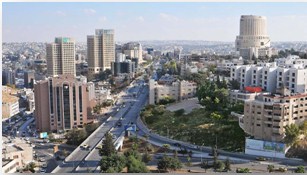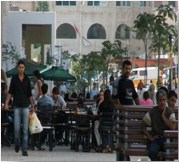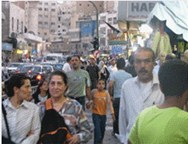To ensure you get the most from your visit to Jordan, it is important to have a
few basic facts on hand before you arrive
Visa Requirements: Any visitor to Jordan, whether for business or tourism, needs
an entry visa. Non restricted nationalities can obtain their Entry visas upon arriving
Jordan at the airport or Jordan land crossings. Certain nationalities require an
entry visa to be obtained prior to travel, Citizens of the following countries are
required to obtain a visa 2-4 Weeks in advance:
A. Africa: Angola, Benin, Botswana, Burkina Faso, Burundi, Cameroon, Central
African Republic, Chad, Congo, Cote d'lviore, Djibouti, Eritrea, Ethiopia, Gabon,
Gambia,Ghana, Guinea, Guinea Bissau, Guyana, Liberia,
Madagascar, Mali, Mauritania, Mozambique, Niger, Nigeria, Senegal, Sierra Leone,
Somalia, Sudan, Tanzania,Togo, Uganda, Zambia.
B. Asia: Afghanistan, Bangladesh, Cambodia, Iran,
Iraq,
Laos, Mongolia, Myanmar, Nepal, Pakistan, Papua New Guinea, Philippines, Sri Lanka, Vietnam
.
C. Europe: Albania,
Moldavia, Bosnia and Herzegovina, Macedonia.
D. South America: Belize, Colombia, Cuba
(The above list is subject to change without prior notice; it is recommended that
you check with us prior to travel to ensure that you have all the necessary paperwork
for travel)
The visa may be authorized or denied by the Jordanian government
The cost of one entry visa for all nationalities is 20 JD (around $30) obtained
upon arrival at the airport; (For multiple entries for all nationalities it is 60
JD (around $85) and should be collected only from Jordanian embassies aboard)
- Groups of five persons or more arriving through a designated Jordanian tour operator
with a government certified tour guide are exempt from all visa charges, provided
the group arrives and departs together as well as stay a minimum of 2 nights in
Jordan.
- Arrivals at Aqaba, either through the port, the airport or at the crossing from
Israel or Saudi Arabia, are granted a free visa to Jordan.
- There is no obligation associated with this visa, provided that they leave the country
within 1 month of arrival, and that they do not need to renew their visa.
- Exit service fee applies for land and sea border points. 8.00 JD per passenger (around
$12).
Land entry into Jordan is possible through Egypt, Israel, Syria, Iraq and Saudi
Arabia
Travel by Land
Visitors with a valid passport may obtain a visa upon arrival at any land crossing
border (except the King Hussein Bridge & the ferryboat from Egypt).
Syria
Visitors’ can Enter Jordan from two crossing points Jaber or Ramtha. Jaber is 80
kms away from Amman and is most commonly used by visitors while Ramtha 90 kms away
is mainly for cargo. Both borders are open 24/7 throughout the year.
Iraq
Visitors’ can Enter Jordan through Al Karamah Border which its 331 km away from
Amman and is open 24/7 throughout the year.
Saudi Arabia
There are three border crossings with Saudi Arabia from the east
- Umari Border Crossing: 155 kms away from Amman and is open 24/7 throughout the year
- Mudawara Border Crossing: 322 kms away from Amman, and is open 24/7 throughout the
year
- Durra Border Crossing: It is in the south , 349 kms away from Amman and is open
24/7 throughout the year
Israel
Visitors’ can Enter Jordan from Three crossing points (Wadi Araba, Allenby, and
Sheikh Hussein):
- Wadi Araba (Southern Border), Located about three kilometers north of Aqaba &
Eilat, It is used by tourists as well as for cargo. 324 km away from Amman, Open
Sun – Thurs 06:30hrs – 22:00hrs and Fri – Sat 0800hrs – 20:00hrs, Closes on Islamic
New Year day and Yom Kippur.
- Allenby Border (King Hussein Bridge) – Pre arranged visa required Located in the
Jordan Valley, east of Jericho, it is about an hour’s drive from Jerusalem in Israel
and from Amman in Jordan, and is the shortest route between Amman and the cities
in Israel’s center. The terminal also serves the Palestinian Authority, and is permitted
for use by Palestinians and foreign tourists. It is also a cargo crossing point
between Israel, The Palestinian Authority and Jordan, 57 km away from Amman, open
Sun. – Thurs. 08:00hrs – 20:00hrs for arrivals and 8:00 to 14:00 for departures
and Fri-Sat 08:00hrs – 13:00hrs.
- Jordan River Border (Sheikh Hussein crossing) (North Border) Its 90 km away from
Amman, Located in the north, close to Lake Tiberias (Sea of Galilee), open 24/7
throughout the year
These hours and regulations are all subject to change, for up-to-date details and
information on which nationalities cannot obtain visas, contact us.

While Arabic is the official language in Jordan, English is also widely spoken.
The Jordan shopping experience is a combination of tradition and modernity, hundreds of producers and workers in the traditional handicraft trade in Jordan, there are a number of shops selling excellent items, such as hand-woven rugs and cushions, glassware, pottery, mother of pearl marquetry, and hand-embroidered articles like caftans. Cheaper than in many other countries is the handmade gold and silver work. The Gold Souq of Amman in downtown comprises over 50 shops. The price of gold is at a fixed rate per gram; the cost of workmanship on a particular piece is added. Unique is also the Bedouin silver jewelry. The best places to look for ceramics and pottery are in Amman and Madaba. Madaba, south of Amman, is the centre for mosaic art, producing an array of souvenirs and handicrafts.
In Jordan you find also the hand-made Hebron glass like carafes, bowls, jars, vases and mugs with the traditional intense colors of dark and light blue, turquoise, dark red, and light and dark green. The most diverse shopping you have in Amman. Stroll in the traditional downtown area offering cheaper products and a cultural experience, and one of the last places where you can try your bargaining skills in Jordan. Or search for the latest fashion in designer boutiques in Shmeisani or Abdoun. Interesting is the area Abu Bakr As-Siddeeq Street (known as Rainbow Street), Gardens Street, Jabal Al Hussein and the Wakalat Street in Sweifeiyeh. Popular shopping centres are Abdoun Mall, Amman Mall, City Mall, Mecca Mall, and the Zara Shopping Centre.
A different experience you can have during summer at Jabal Amman. Here every Friday Souk Jara, a kind of flea market, opens its doors with handicrafts, antiques, paintings, handmade accessories and entertainment.

Jordan Daily life and social customs
Jordan is an integral part of the Arab world and thus shares a cultural tradition common to the region. The family is of central importance to Jordanian life. Although their numbers have fallen as many have settled and adopted urban culture, the rural Bedouin population still follows a more traditional way of life, preserving customs passed down for generations. Village life revolves around the extended family, agriculture, and hospitality; modernity exists only in the form of a motorized vehicle for transportation. Urban-dwelling Jordanians, on the other hand, enjoy all aspects of modern, popular culture, from theatrical productions and musical concerts to operas and ballet performances. Most major towns have movie theatres that offer both Arab and foreign films. Younger Jordanians frequent Internet cafés in the capital, where espresso is served at computer terminals.
There are many international and local fast food restaurants offering fast food in Jordan such as, Burger King, McDonalds, KFC and Pizza Hut, for those interested in local fast food, Falafel and chicken or meat Shawermah Sandwiches are very popular fast food meals in Jordan.

Clothing /Public Appearance
Jordan is a primary a Muslim country, although the freedom of all religions is protected. Muslim women's clothing often covers their arms, legs and hair. Western women are not subject to these customs, but very revealing clothing is never appropriate, and conservative dress is advisable for both men and women in the old part of Amman (Downtown), and outside the cities, dress should continue to be modest, Shorts are rarely worn by either sex, and would be out of place in downtown Amman area. Topless sunbathing is prohibited and one-piece swimsuits are preferred, although two-piece swimsuits are acceptable at hotels pools. Even in summer, evenings can be cool, so sweater or shawl is advisable. Winters can be extremely cold, especially in Amman and the east; you will need a raincoat. Walking shoes are advisable since Petra and most of the archeological sites are unpaved and sandy.
Transportation
The city's main airport, Queen Alia International Airport, is situated about 30 minutes south of Amman and hosts the majority of the air travel to and from the country. By land, the city has frequent bus connections to other cities in Jordan as well as to major cities in neighboring countries; the latter are also served by service taxis. Internal transport is served by a number of bus routes and taxis. Service taxis, which most often operate on fixed routes, are readily available and inexpensive. The main two buses and taxi stations are Abdali (near the King Abdullah Mosque, the Parliament and Palace of Justice) and Raghadan (near the Roman Amphitheatre in Downtown). The city can suffer from considerable traffic congestion at peak hours, especially during summer months when affluent vacationers from the Gulf region summer in Amman to take advantage of its relatively mild weather.
Insurance
Traveler should take out comprehensive travel and medical insurance before travelling. Ensure your insurance covers unexpected losses or expenses, lost luggage, stolen cash and credit cards or cancelled/missed flights.
One final word...If you're having trouble finding your way, don't hesitate to ask a passerby, as most people will be delighted to help.s.
Road Distances between in KM between Cities